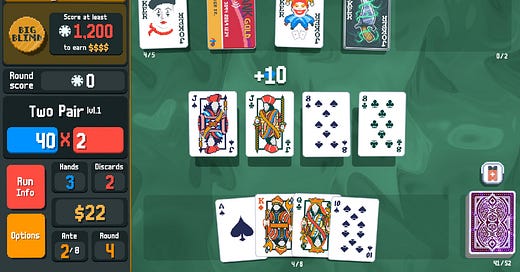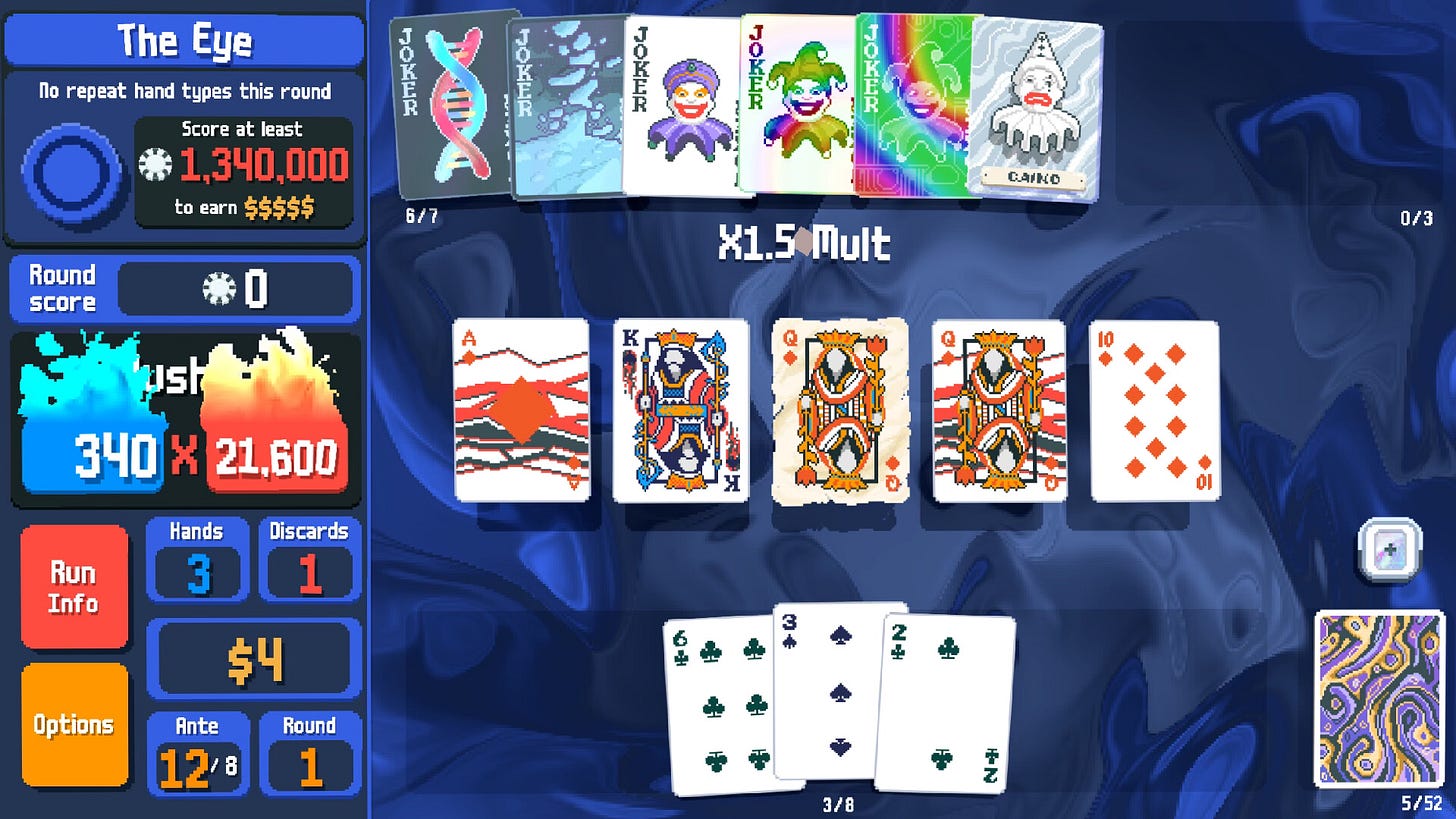Balatro’s 18+ Rating Underscores Gaming’s Hypocritical “Protecting” Children Rhetoric
Loot boxes pass through regulatory and rating scrutiny without batting an eye, but a card game? My word!
What are we trying to keep children safe from?
This has been a driving force behind Crossplay since the start, and what I’ve found time and time again are, at best, misguided decisions filled with hypocrisy, what can only be described as straight forward exploitation of kids—or just plain confusion.
This latest one, involving the tremendous poker-inspired game, Balatro, falls in the final bucket, but at its core speaks to a more distressing trend in how we characterize “dangerous” games, while legitimately dangerous trends pass by without comment.
Balatro took home a slew of victories at The Game Awards, including best Debut Indie Game and Best Indie Game. It’s a very good game, and I don’t recommend playing it, as you will not stop. Days later, Balatro designer LocalThunk issued blistering criticism at Europe’s version of the ESRB, PEGI, for giving Balatro an 18+ rating.
“Since PEGI gave us an 18+ rating for having evil playing cards maybe I should add microtransactions/loot boxes/real gambling to lower that rating to 3+ like EA sports FC,” said LocalThunk, before linking to PEGI’s pages for EA Sports FC 25 and Balato. “This is comedy.”
(In the U.S., the ESRB (Entertainment Software Ratings Board) issues ratings, while PEGI (Pan European Game Information) handles similar ratings for Europe.)
This controversy is not new—the game’s designer has been fighting this all 2024.
The pages are, in fact, worth reading. Here’s how PEGI describes Balatro:
“This game teaches - by way of images, information and gameplay - skills and knowledge that are used in poker. During gameplay, the player is rewarded with ‘chips’ for playing certain hands. The player is able to access a list of poker hand names. As the player hovers over these poker hands, the game explains what types of cards the player would need in order to play certain hands. As the game goes on, the player becomes increasingly familiar with which hands would earn more points. Because these are hands that exist in the real world, this knowledge and skill could be transferred to a real-life game of poker.”
PEGI did not respond to a request for comment from Crossplay.
“This skill could be transferred to a real-life game of poker” is a stone’s throw away from foolhardy framing claiming first-person-shooter video games are training kids to use real guns. Sure, Balatro can train you to recognize pairs of cards. Okay, and?
Poker is a card game. There is nothing inherently malicious about it. If anything, learning poker is to understand a complex series of intersecting math problems. Are we suggesting that a child who plays a hand of poker with their parents is a deviant?
Compare this to how PEGI rationalizes EA Sports FC 25, a game whose business model involves buying packs of randomized cards in loot box form, a monetization strategy built on the back of dark patterns and FOMO and psychological tricks.
“This game offers players the opportunity to purchase in-game items, in the form of an in-game currency, which can be used to purchase random card packs and other game items. Some parents or carers may want to be aware of this. Parents, carers or other responsible adults should check to see what is being offered before making any purchase on behalf of a child. It should be noted that the game can still be played without the need to purchase such items.”
Interestingly, ESRB describes Balatro, rated over here as E10+, quite differently:
“This is a card simulation/deck-building game in which players create winning hands to earn chips and defeat enemy blinds. Players earn points/chips for each winning hand and must match and/or exceed a specific score to win rounds. The game has a poker theme, which includes the names of hands, scoring system, and types of playing cards, but does not include making wagers.”
Gambling is everywhere.
You can’t watch a sporting event these days without over/unders and other stats scrolling through your feed, alongside injury and trade reports. My eight-year-old isn’t picking up on any of that—well, beyond when I ask her to place some goofy bets with me during the Super Bowl—but the appearance of gambling is not the same thing.
It’s perfectly fair to ding Balatro a bit for bathing in the aesthetics of gambling, and it’s also fair to point out that poker, as a game, is connected to gambling. But that’s it!
You’re saying Balatro is “dangerous” because gambling via poker is popular. Explain to me how that’s helpful to help guide parents or children on appropriate content, while giving Roblox a pass because it’s full of user generated content that’s hard to judge?
I asked LocalThunk about this earlier this year, when Balatro came to Apple Arcade, a service that says it’s for ages 12+ and “infrequent/mild simulated gambling.” I told LocalThunk one of my kids looked over my shoulders while playing, and it turned into an exercise where I’d ask her some basic math problems while I was working out a run in the game. I didn’t blink twice, but wondered if he’d given the idea any thought.
“I think people are too judgmental about the surface level themes without thinking about what the game actually teaches you,” said LocalThunk to me back in October. “If a kid is able to grasp the mechanics of the game, I think it’s a great game to learn about probability, math, and problem solving skills, and it does nothing to teach you about betting or wagering. If anything, a better understanding of probabilities should push people away from gambling.”
The hypocrisy is, understandably, what seems to grate LocalThunk.
(I asked for additional comment on the situation through a representative but they declined.)
“I’m way more irked at the 3+ for these games with actual gambling mechanics for children than I am about Balatro having an 18+ rating,” said LocalThunk. “If these other games were rated properly I’d happily accept the weirdo 18+. The red logo looks kinda dope.”
Indeed.
Have a story idea? Want to share a tip? Got a funny parenting story? Drop Patrick an email.
Also:
Gambling is conceptually about risk vs. reward, and using games to explore concepts of success, failure, and less feel like pretty safe environments for it.
I “beat” Balatro once and never went back. In my mind, and what I tell anyone who might ask, is that I beat Balatro. You cannot convince me of anything else.
I turned my wife onto Balatro a few weeks back, and for a hot minute, it was all she was doing. I swear every time I looked at her iPad, she was doing another run.







It's completely ridiculous. Knowing the ranking of poker hands in order to play a silly deck building game does not teach you how to play poker for money in any meaningful way. Clubhouse games (released as 51 Worldwide Games in Europe), a game that actually teaches you how to play Texas Hold 'em and Blackjack by casino rules, only got a 12+ by PEGI
basically both pegi and esrb make these decisions on the fly, without really doing much comparative analyses with their own databases or against each others.
afaik they’re generally understaffed / behind as well. its clear the results end up having a lot of contradictory or hypocritical ratings, but idk who would ever lead a push to improve it, and im
not certain money should be put into these groups at all, so here we are